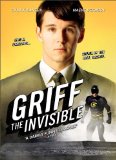| Reviews & Columns |
|
Reviews DVD TV on DVD Blu-ray 4K UHD International DVDs In Theaters Reviews by Studio Video Games Features Collector Series DVDs Easter Egg Database Interviews DVD Talk Radio Feature Articles Columns Anime Talk DVD Savant Horror DVDs The M.O.D. Squad Art House HD Talk Silent DVD
|
DVD Talk Forum |
|
|
| Resources |
|
DVD Price Search Customer Service #'s RCE Info Links |
|
Columns
|
|
|
Griff the Invisible
Vivendi Entertainment // PG-13 // November 15, 2011
List Price: $29.95 [Buy now and save at Amazon]
The Film:
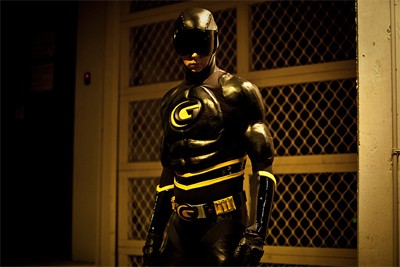 I suppose we've reached the point where a subgenre has emerged from the "everyman superhero" idea. It makes sense, considering the recent surge of popularity towards Batman (the pinnacle of the no-superpower hero) and the adaptation of Mark Millar's subversive comics to the big screen, that differing perspectives on what comprises an effective examination of aggrandized, pushed-to-the-limit vigilantism would stake their ground. They all have their strengths, from Kick-Ass's candy-coated violence and Defendor's shocking dramatic streak to the down-and-out nasty fury of James Gunn's Super, as well as areas where they slave away at filling in gaps where the others neglected. The fresh ground that Leon Ford's Griff the Invisible adamantly tries to explore is that of romance and returning to normalcy in a contorted, introverted hero's mind, while retracing the same weatherworn tracks that others of its kind have already traveled. Good intentions go a long way with this one, though.
I suppose we've reached the point where a subgenre has emerged from the "everyman superhero" idea. It makes sense, considering the recent surge of popularity towards Batman (the pinnacle of the no-superpower hero) and the adaptation of Mark Millar's subversive comics to the big screen, that differing perspectives on what comprises an effective examination of aggrandized, pushed-to-the-limit vigilantism would stake their ground. They all have their strengths, from Kick-Ass's candy-coated violence and Defendor's shocking dramatic streak to the down-and-out nasty fury of James Gunn's Super, as well as areas where they slave away at filling in gaps where the others neglected. The fresh ground that Leon Ford's Griff the Invisible adamantly tries to explore is that of romance and returning to normalcy in a contorted, introverted hero's mind, while retracing the same weatherworn tracks that others of its kind have already traveled. Good intentions go a long way with this one, though.
Even though True Blood star Ryan Kwanten tries to prove otherwise, we've seen the likes of Griff before: a submissive, recoiled, socially-awkward office monkey, not unlike Wesley from Wanted, moonlighting as a costumed night-watchman who looks strikingly like Tim Burton's Batman in a riot helmet. With his apartment planted in the dark corner of a city overrun with vandals and prowlers, Griff pours the money he makes at his dime-a-dozen cubicle job into his "true" profession, where he's orchestrated an elaborate camera, telescope and alarm system (Harry Caul would be proud) to monitor the area and notify him that "Griff the ______" (he's working on that) is needed. Some seem to know about Griff's secret identity, though, such as his caring brother who moved back to the area to keep an eye on him, supposedly after a run-in with the law. And another might've stumbled onto his secret: Melody, an "experimental researcher" dating his brother, who might be just as imaginative, idealistic, and potentially unhinged as Griff.
Balancing vivid color use with the thick and gritty allure that comes from shooting on 16mm film, Griff the Invisible stands out among others of its type with a distinctive, albeit modest aesthetic perspective, the vibrant palette painting Griff's war on street-level hooligans with broad comic-inspired strokes. It heightens the environment around the hero to appear like he's encapsulated in dire situations as they'd appear in the panels of a graphic novel, counterbalanced against the sterile, empty look befalling his work environment, reflecting on his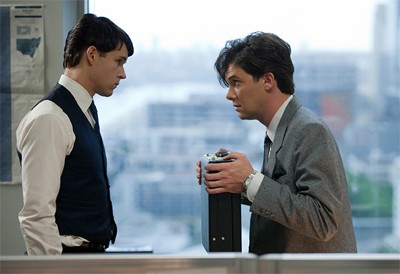 emptiness while going about his unhappy "real life". Director Ford minimizes the action to emphasize the ways that Griff copes with balancing the two sides of his life, even though he does execute a few low-key action set pieces that reveal the hero's no joke. Even down to his crime-fighting toys and his suit, clearly (and suggestively) inspired by a certain famous Caped Crusader, careful thought lingers in the budgeted but appealing look of Griff's heightened-reality world.
emptiness while going about his unhappy "real life". Director Ford minimizes the action to emphasize the ways that Griff copes with balancing the two sides of his life, even though he does execute a few low-key action set pieces that reveal the hero's no joke. Even down to his crime-fighting toys and his suit, clearly (and suggestively) inspired by a certain famous Caped Crusader, careful thought lingers in the budgeted but appealing look of Griff's heightened-reality world.
Yet, when it comes to the challenging components surrounding explorations of the do-it-yourself superhero -- their loosening grasp on reality, a disconnect with society, and the legality of what they're doing -- Griff the Invisible mines areas that have already been tapped by its recent predecessors, only in a glib, easier-to-swallow, yet admittedly charismatic fashion. Even if that's the case, director Ford commits to making them feel individual to Griff's story, exploring the mindset of this particular cubicle-dweller who finds purpose in making the streets around his apartment safer. Granted, the story's fairly anemic, a more blithe pastiche of its precursors that semi-humorously follows the same beats, whether we're talking about Griff's psychology or his invigorated uprising in the real world due to his off-the-clock activities. Considering that, there's still something to be said about Ford's perspective on the hero, alongside some of the complexity behind introverted, slightly-off citizens going about normal lives.
Turns out, Griff the Invisible isn't about saying something regarding the vigilante nature, but in a decidedly sweet-natured romance blossoming within it, and how a pair of askew minds counterbalances one another despite their distorted view of the world. Through a handful of scenes that might faintly remind one of the fingerprints that Michel Gondry could leave, creative and inventive but practical in their usage, director Ford takes the skeletal structure it establishes and fleshes it out with the off-kilter, quirky relationship between the deceiving superhero and an attractive corner-shop researcher who has an eye for his obscurity. Pure charm -- alongside an infectiously chaste chemistry that stirs in the conversations between the discomfited Griff and the resolute, science-minded Melody -- becomes the glue that latches the film's components together, especially with the bold, accepting personality Melody brings to the conversation.
Griff and the resolute, science-minded Melody -- becomes the glue that latches the film's components together, especially with the bold, accepting personality Melody brings to the conversation.
Despite its spotty successes, and even considering the adult-minded twist of a climax that the film arrives at, Griff the Invisible is a tough one to pin down. Those weathered to the subgenre will find less brutality, gloom, and provocative content than they're accustomed to, while those drawn into in its defiantly indie-film romance will still have to juggle its scattered focus and a stale narrative that smacks of an overdose on influence. Down to the way the film's presented in marketing, it's sizing itself up for an audience that it's not likely to satisfy, but Leon Ford's viewpoint has one watertight attribute going for it: it's stubbornly likable, from the polished look to the unswerving performances from Ryan Kwanten as Griff and Maeve Dermody as Melody, and in that, it's wholly reasonable to embrace this as the subgenre's romantic-comedy riff -- roughly realized as it may be. A touch of sincerity and a touching, gracefully-built purpose give it reason enough to coexist among its like-minded contemporaries.
The Blu-ray:
Video and Audio:
Accurate or not as this Blu-ray might be, Griff the Invisible swings into action as a unique and visually ensnaring high-definition experience. The 16mm 1.85:1 cinematography natively possesses a lower-level caliber of detail and coarser grain than one might expect (see Black Swan for another example), latching onto a bulky, granular veneer layered atop the modernistic lighting and production work -- and it actually looks really cool in Vivendi Entertainment's 1080p treatment. Now, even with the native film-stock in mind, the heaviness of the grain and the haziness of detail occasionally seem to venture outside the realm of authenticity, mostly prominent in lighter interior shots (Melody sitting at her desk and some of the shots in Griff's kitchen being the main culprits). Darker shots, however, can be immensely satisfying; the sheen on Griff's costume, the richness of darker palette choices, and the level of depth improves as the image darkens.
No question about this, however: Griff the Invisible packs a punch in the 5-channel DTS-HD Master Audio track, and not just considering action-oriented effects. Sure, those moments stand out -- the fisticuffs at the beginning of the film fiercely thump with punches and slams against a wall, while the screeching of tires from a speeding car feed from the front-channels to the rear. Engulfing elements cleanly pour from the extremities of the track, whether it's the subtle chatter in an office environment to the thumping of feet on wet concrete. And the kitschy, almost pulpy musical rhythm jostle lower-frequency activity as well. It has a few fleeting issues with verbal clarity, though: one woman's dialogue gets lost in the spinning of tires (evne though you can get the point of what she's saying) and other lower-key prattle sounds a little muffled. Aside from that, the aural delivery bounces along swimmingly with the rough-and-tumble visual treatment.
Special Features:
Audio Commentary with Director Leon Ford, Producer Nicole O'Donohue, and Patrick Brammall: Here, the trio go through th emotions of a standard commentary track, getting into the genesis of the project -- which occurred five or six years prior to its release -- and delving into specific scenes, shooting locations, writing elements, and overall conceptualization. They discuss late-night shoots in alleyways, Ryan Kwanten's involvement, marrying the look of the film with the music (including the origin and spooky serendipity behind Melody's "theme", and the origin of some of the film's visual tricks -- such as using wallpaper pattern over a hand to nail down a neat effect. The pacing drags at times due to the conversational rhythm, but the material here is assuredly worth the time.
Alongside that, Griff the Invisible also arrives with a series of Making-Of Featurettes that are greater in number than they are in substance: a brief, standard Behind The Scenes (4:08, SD) piece, a few Anatomy of a Scene analyses with storyboards and ADR-recording footage for the Opening Sequence (3:16, SD), the All-In-One Shot (2:16, SD), and the Anyhoo (2:00, SD) scene in the apartment, as well as quick bits entitled Rain Stops Play (1:16, SD) and Patrick's Set Tour (1:24). We've also got Appear Calm: Diary of a First Time Director, which encompasses three brief video-log snippets from Leon Ford's time on-set: Pre-Production (1:25, SD), The Shoot (3:11, SD), and Post Production (2:42, SD).
Rounding things out, we've also got a series of inessential but fun-to-watch Deleted Scenes (7:36). Unfortunately, no trailer has been made available for the film, though you can check one out at Indomina Releasing's official website for the film.
Final Thoughts:
Griff the Invisible might be the lowest man on the totem pole, but Leon Ford's lighthearted, whimsical take of the do-it-yourself superhero story accomplishes enough for it to stand strong among other like-minded films. Exchanging punchy violence and subversive intensity for romance and a subtly endearing examination of an introverted do-gooder, its greatest strengths come in an amiable nature and charm, and assuredly not from a deeply-woven or innovative narrative. It is, however, unique in comparison, both in visual and tonal temper, and I had a fine time reveling in Griff's uncomfortable neuroses and Melody's attempts to keep him just the way he is. Vivendi Entertainment's Blu-ray preserves the grainy looks that is (assumedly) intended for the film, crafting a distinctively dazzling audiovisual experience to accompany the Film's slick style, while a slate of special features -- including scoop-off-the-top featurettes and a decent commentary -- add something to the after-viewing experience. Recommended.
Thomas Spurlin, Staff Reviewer -- DVDTalk Reviews | Personal Blog/Site
 I suppose we've reached the point where a subgenre has emerged from the "everyman superhero" idea. It makes sense, considering the recent surge of popularity towards Batman (the pinnacle of the no-superpower hero) and the adaptation of Mark Millar's subversive comics to the big screen, that differing perspectives on what comprises an effective examination of aggrandized, pushed-to-the-limit vigilantism would stake their ground. They all have their strengths, from Kick-Ass's candy-coated violence and Defendor's shocking dramatic streak to the down-and-out nasty fury of James Gunn's Super, as well as areas where they slave away at filling in gaps where the others neglected. The fresh ground that Leon Ford's Griff the Invisible adamantly tries to explore is that of romance and returning to normalcy in a contorted, introverted hero's mind, while retracing the same weatherworn tracks that others of its kind have already traveled. Good intentions go a long way with this one, though.
I suppose we've reached the point where a subgenre has emerged from the "everyman superhero" idea. It makes sense, considering the recent surge of popularity towards Batman (the pinnacle of the no-superpower hero) and the adaptation of Mark Millar's subversive comics to the big screen, that differing perspectives on what comprises an effective examination of aggrandized, pushed-to-the-limit vigilantism would stake their ground. They all have their strengths, from Kick-Ass's candy-coated violence and Defendor's shocking dramatic streak to the down-and-out nasty fury of James Gunn's Super, as well as areas where they slave away at filling in gaps where the others neglected. The fresh ground that Leon Ford's Griff the Invisible adamantly tries to explore is that of romance and returning to normalcy in a contorted, introverted hero's mind, while retracing the same weatherworn tracks that others of its kind have already traveled. Good intentions go a long way with this one, though. Even though True Blood star Ryan Kwanten tries to prove otherwise, we've seen the likes of Griff before: a submissive, recoiled, socially-awkward office monkey, not unlike Wesley from Wanted, moonlighting as a costumed night-watchman who looks strikingly like Tim Burton's Batman in a riot helmet. With his apartment planted in the dark corner of a city overrun with vandals and prowlers, Griff pours the money he makes at his dime-a-dozen cubicle job into his "true" profession, where he's orchestrated an elaborate camera, telescope and alarm system (Harry Caul would be proud) to monitor the area and notify him that "Griff the ______" (he's working on that) is needed. Some seem to know about Griff's secret identity, though, such as his caring brother who moved back to the area to keep an eye on him, supposedly after a run-in with the law. And another might've stumbled onto his secret: Melody, an "experimental researcher" dating his brother, who might be just as imaginative, idealistic, and potentially unhinged as Griff.
Balancing vivid color use with the thick and gritty allure that comes from shooting on 16mm film, Griff the Invisible stands out among others of its type with a distinctive, albeit modest aesthetic perspective, the vibrant palette painting Griff's war on street-level hooligans with broad comic-inspired strokes. It heightens the environment around the hero to appear like he's encapsulated in dire situations as they'd appear in the panels of a graphic novel, counterbalanced against the sterile, empty look befalling his work environment, reflecting on his
 emptiness while going about his unhappy "real life". Director Ford minimizes the action to emphasize the ways that Griff copes with balancing the two sides of his life, even though he does execute a few low-key action set pieces that reveal the hero's no joke. Even down to his crime-fighting toys and his suit, clearly (and suggestively) inspired by a certain famous Caped Crusader, careful thought lingers in the budgeted but appealing look of Griff's heightened-reality world.
emptiness while going about his unhappy "real life". Director Ford minimizes the action to emphasize the ways that Griff copes with balancing the two sides of his life, even though he does execute a few low-key action set pieces that reveal the hero's no joke. Even down to his crime-fighting toys and his suit, clearly (and suggestively) inspired by a certain famous Caped Crusader, careful thought lingers in the budgeted but appealing look of Griff's heightened-reality world. Yet, when it comes to the challenging components surrounding explorations of the do-it-yourself superhero -- their loosening grasp on reality, a disconnect with society, and the legality of what they're doing -- Griff the Invisible mines areas that have already been tapped by its recent predecessors, only in a glib, easier-to-swallow, yet admittedly charismatic fashion. Even if that's the case, director Ford commits to making them feel individual to Griff's story, exploring the mindset of this particular cubicle-dweller who finds purpose in making the streets around his apartment safer. Granted, the story's fairly anemic, a more blithe pastiche of its precursors that semi-humorously follows the same beats, whether we're talking about Griff's psychology or his invigorated uprising in the real world due to his off-the-clock activities. Considering that, there's still something to be said about Ford's perspective on the hero, alongside some of the complexity behind introverted, slightly-off citizens going about normal lives.
Turns out, Griff the Invisible isn't about saying something regarding the vigilante nature, but in a decidedly sweet-natured romance blossoming within it, and how a pair of askew minds counterbalances one another despite their distorted view of the world. Through a handful of scenes that might faintly remind one of the fingerprints that Michel Gondry could leave, creative and inventive but practical in their usage, director Ford takes the skeletal structure it establishes and fleshes it out with the off-kilter, quirky relationship between the deceiving superhero and an attractive corner-shop researcher who has an eye for his obscurity. Pure charm -- alongside an infectiously chaste chemistry that stirs in the conversations between the discomfited
 Griff and the resolute, science-minded Melody -- becomes the glue that latches the film's components together, especially with the bold, accepting personality Melody brings to the conversation.
Griff and the resolute, science-minded Melody -- becomes the glue that latches the film's components together, especially with the bold, accepting personality Melody brings to the conversation. Despite its spotty successes, and even considering the adult-minded twist of a climax that the film arrives at, Griff the Invisible is a tough one to pin down. Those weathered to the subgenre will find less brutality, gloom, and provocative content than they're accustomed to, while those drawn into in its defiantly indie-film romance will still have to juggle its scattered focus and a stale narrative that smacks of an overdose on influence. Down to the way the film's presented in marketing, it's sizing itself up for an audience that it's not likely to satisfy, but Leon Ford's viewpoint has one watertight attribute going for it: it's stubbornly likable, from the polished look to the unswerving performances from Ryan Kwanten as Griff and Maeve Dermody as Melody, and in that, it's wholly reasonable to embrace this as the subgenre's romantic-comedy riff -- roughly realized as it may be. A touch of sincerity and a touching, gracefully-built purpose give it reason enough to coexist among its like-minded contemporaries.
The Blu-ray:
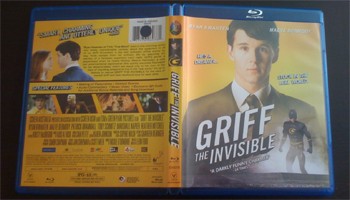 | 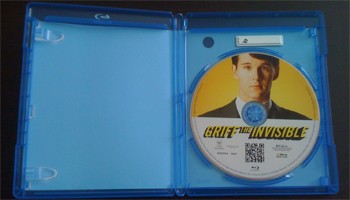 |
Video and Audio:
Accurate or not as this Blu-ray might be, Griff the Invisible swings into action as a unique and visually ensnaring high-definition experience. The 16mm 1.85:1 cinematography natively possesses a lower-level caliber of detail and coarser grain than one might expect (see Black Swan for another example), latching onto a bulky, granular veneer layered atop the modernistic lighting and production work -- and it actually looks really cool in Vivendi Entertainment's 1080p treatment. Now, even with the native film-stock in mind, the heaviness of the grain and the haziness of detail occasionally seem to venture outside the realm of authenticity, mostly prominent in lighter interior shots (Melody sitting at her desk and some of the shots in Griff's kitchen being the main culprits). Darker shots, however, can be immensely satisfying; the sheen on Griff's costume, the richness of darker palette choices, and the level of depth improves as the image darkens.
No question about this, however: Griff the Invisible packs a punch in the 5-channel DTS-HD Master Audio track, and not just considering action-oriented effects. Sure, those moments stand out -- the fisticuffs at the beginning of the film fiercely thump with punches and slams against a wall, while the screeching of tires from a speeding car feed from the front-channels to the rear. Engulfing elements cleanly pour from the extremities of the track, whether it's the subtle chatter in an office environment to the thumping of feet on wet concrete. And the kitschy, almost pulpy musical rhythm jostle lower-frequency activity as well. It has a few fleeting issues with verbal clarity, though: one woman's dialogue gets lost in the spinning of tires (evne though you can get the point of what she's saying) and other lower-key prattle sounds a little muffled. Aside from that, the aural delivery bounces along swimmingly with the rough-and-tumble visual treatment.
Special Features:
Audio Commentary with Director Leon Ford, Producer Nicole O'Donohue, and Patrick Brammall: Here, the trio go through th emotions of a standard commentary track, getting into the genesis of the project -- which occurred five or six years prior to its release -- and delving into specific scenes, shooting locations, writing elements, and overall conceptualization. They discuss late-night shoots in alleyways, Ryan Kwanten's involvement, marrying the look of the film with the music (including the origin and spooky serendipity behind Melody's "theme", and the origin of some of the film's visual tricks -- such as using wallpaper pattern over a hand to nail down a neat effect. The pacing drags at times due to the conversational rhythm, but the material here is assuredly worth the time.
Alongside that, Griff the Invisible also arrives with a series of Making-Of Featurettes that are greater in number than they are in substance: a brief, standard Behind The Scenes (4:08, SD) piece, a few Anatomy of a Scene analyses with storyboards and ADR-recording footage for the Opening Sequence (3:16, SD), the All-In-One Shot (2:16, SD), and the Anyhoo (2:00, SD) scene in the apartment, as well as quick bits entitled Rain Stops Play (1:16, SD) and Patrick's Set Tour (1:24). We've also got Appear Calm: Diary of a First Time Director, which encompasses three brief video-log snippets from Leon Ford's time on-set: Pre-Production (1:25, SD), The Shoot (3:11, SD), and Post Production (2:42, SD).
Rounding things out, we've also got a series of inessential but fun-to-watch Deleted Scenes (7:36). Unfortunately, no trailer has been made available for the film, though you can check one out at Indomina Releasing's official website for the film.
Final Thoughts:
Griff the Invisible might be the lowest man on the totem pole, but Leon Ford's lighthearted, whimsical take of the do-it-yourself superhero story accomplishes enough for it to stand strong among other like-minded films. Exchanging punchy violence and subversive intensity for romance and a subtly endearing examination of an introverted do-gooder, its greatest strengths come in an amiable nature and charm, and assuredly not from a deeply-woven or innovative narrative. It is, however, unique in comparison, both in visual and tonal temper, and I had a fine time reveling in Griff's uncomfortable neuroses and Melody's attempts to keep him just the way he is. Vivendi Entertainment's Blu-ray preserves the grainy looks that is (assumedly) intended for the film, crafting a distinctively dazzling audiovisual experience to accompany the Film's slick style, while a slate of special features -- including scoop-off-the-top featurettes and a decent commentary -- add something to the after-viewing experience. Recommended.
|
| Popular Reviews |
| Sponsored Links |
|
|
| Sponsored Links |
|
|
| Release List | Reviews | Shop | Newsletter | Forum | DVD Giveaways | Blu-Ray | Advertise |
|
Copyright 2024 DVDTalk.com All Rights Reserved. Legal Info, Privacy Policy, Terms of Use,
Manage Preferences,
Your Privacy Choices | |||||||









